Church History: Books of the Month
February 2025
Monthly Updates on Recent Books in the History of Christianity
To raise awareness of recent books in the history of Christianity, the editorial staff of Church History: Studies in Christianity and Culture highlights each month a list of 10-15 books in diverse periods and geographical regions that we hope will be of interest to our members. We include here below the 52nd monthly list, chosen by our staff, with excerpts from the publishers’ blurbs.
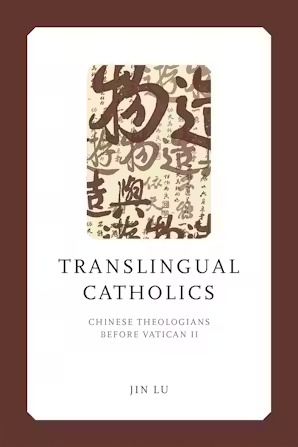
Jin Lu, Translingual Catholics: Chinese Theologians before Vatican II. 2025
Weaving together archival resources in Chinese, French, and English, Translingual Catholics examines the preconciliar theological contribution of Republican-Era Chinese Catholics to global Catholicism and to the dialogue between Christianity and Chinese spiritual traditions. Author Jin Lu sheds light on generations of multilingual Chinese Catholic intellectuals who participated in the elaboration of Catholic theology leading up to the Second Vatican Council. This book situates the lives and works of these theologians in the intersecting global Catholic networks of the time, especially the Jesuit enclave of Xujiahui in Shanghai, the Benedictine Abbey of Saint-André in Bruges, Belgium, the Jesuit Theologate in Lyon-Fourvière, and the ecumenical Cercle Saint-Jean-Baptiste in Paris. By studying the interconnectedness of Chinese Catholic theologians working in multiple languages, Lu demonstrates that inculturation is necessarily a translingual process.
Through its groundbreaking archival research, Translingual Catholics tells the story of these underappreciated intellectuals and uncovers significant contributions to Chinese and global Catholic theology.
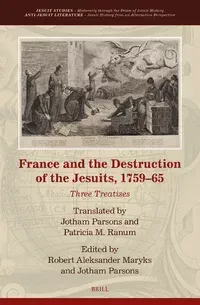
Robert Aleksandr Maryks and Jotham Parsons, eds. France and the Destruction of the Jesuits, 1759–65. Three Treatises. Translated by Patricia M. Ranum. 2025
The second volume in the Anti-Jesuit Literature series at Brill casts a revealing light on a crucial moment in eighteenth-century France: the suppression of the Jesuits. Through the expert translation of three representative treatises by Jotham Parsons and Patricia M. Ranum, this collection delves into the heart of the conflict, presenting views from Jansenist-Gallican magistrates, conservative clerics, and Enlightenment thinkers. Edited with contextual commentary by Robert A. Maryks and Jotham Parsons, the volume not only navigates the complexities of the Jesuits’ decline but also places it in the context of the broader Enlightenment critique, exploring the intricate interplay between evolving ideas of governance, faith, and intellectual freedom.
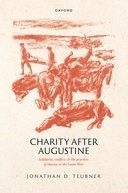
Jonathan Teubner, Charity after Augustine: Solidarity, Conflict, and the Practices of Charity in the Latin West. 2024
Through a unique blend of the personal and historiographical, Charity after Augustine is an exploration of why the Augustinian tradition’s attempts to build solidarity or social cohesion in the societies of the Latin West have ended in disaster just as often as they have brought about justice. The conceit at the heart of the book is that the concrete practices of love or charity—almsgiving, works of mercy, good works—can tell us much about how religious leaders attempted to bind and hold communities together while also, in fits and starts with some startling reversions, attempting to expand the community and incorporate others. The first part probes the ways Augustine’s understanding of love is put into practice and how this understanding informs a tradition of political action inspired by Christian concepts of love and enacted through practices of charity. In a second, more expansive part, the book turns to the ways in which the Benedictine tradition as illustrated by Gregory the Great and Bernard of Clairvaux receives this vision, invigorates it with new visions of care and leadership, and puts it into practice in radically different contexts from those of Augustine’s age. At the heart of Charity after Augustine is an attempt to find a non-idealized vision of love that can inform thick, meaningful relations within a community that are not diluted by the inclusion of others.
Michael Wheeler, William Ewart Gladstone: The Heart and Soul of a Statesman. 2025
The leading statesman of nineteenth-century Britain, a figure who bestrode the political world like a Colossus, is 'Gladstone' to modern biographers. In order to signal the difference between Wheeler's approach and those of earlier biographers, the subject of this book is known as William, his baptismal name. His autobiographical fragments of 1892 included a disclaimer: 'I do not indeed intend in these notes to give a history of the inner life, which I think has with me been extraordinarily dubious, vacillating, and (above all) complex'. William Gladstone: The Heart and Soul of a Statesman is about the spiritual dimension of his complex inner life. In tracing the movements of his heart and soul, the book works from the inner to the outer aspects of a rich and varied life, from William's daily disciplines of prayer and reflection to his earnest attempts to follow the precepts of Christianity through action in the public realm and in private philanthropy, and in the writing of numerous reviews, articles, and books. He remained an independent intellectual, eschewing party labels within the Church of England and working out his own stance in relation to specific Liberal party policies in politics. He was as much a man of letters as he was a politician. Later in his political career, 'the people's William' appealed to public opinion through a series of national moral campaigns. His fiercest battles, however, were spiritual, as he castigated himself for falling short of the ideals set out in Jesus' sermon on the mount, particularly with regard to sexual desire as he sought to rescue women from a life of prostitution and became infatuated with a former courtesan. His longest crusade was against the enemy within.
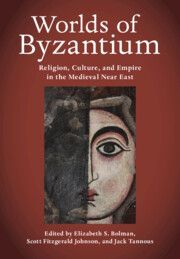
Elizabeth S. Bolman, Scott Fitzgerald Johnson, and Jack Tannouse, eds. Worlds of Byzantium Religion, Culture, and Empire in the Medieval Near East. 2024
Worlds of Byzantium offers a new understanding of what it means to study the history and visual culture of the Byzantine empire during late antiquity and the Middle Ages. Arguing that linguistic and cultural frontiers do not always coincide with political ones, it suggests that Byzantine studies should look not only within but also beyond the borders of the Byzantine empire and include the history of Christian populations in the Muslim-ruled Middle East and neighbouring states like Ethiopia and Armenia and integrate more closely with Judaic and Islamic studies. With essays by leading scholars in a wide range of fields, it offers a vision of a richly interconnected eastern Mediterranean and Near East that will be of interest to anyone who studies the premodern world.
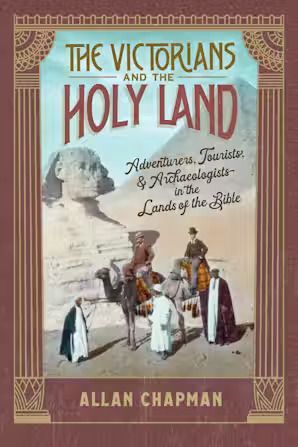
Allan Chapman, The Victorians and the Holy Land: Adventurers, Tourists, and Archaeologists in the Lands of the Bible. 2025
Why were people in the Victorian age fascinated with the archaeological mysteries of the Holy Land?
In this engaging study, Allan Chapman shows how the Holy Land took on new meaning for Europeans during the Victorian era. Previously, most Europeans had viewed the area between the Mediterranean Sea and the eastern bank of the Jordan River as a literary backdrop for biblical narratives. During the nineteenth century, however, they began to take interest in this region as a literal, physical place. Technological inventions such as steam-powered travel, telegraphy, and photography made the Holy Land more accessible. In public museums, ordinary people could view artifacts ranging from Egyptian mummies to statues from Nimrud and Nineveh. In linguistics, translations of Egyptian hieroglyphs and Assyrian cuneiform broadened Europeans’ awareness of myths, legends, and history. These discoveries in archaeology and linguistics brought new energy to nineteenth-century debates about whether the Scriptures were based on factual history.
In addition to explaining how Holy Land studies changed during the Victorian era, Allan Chapman identifies key people who facilitated those changes. He introduces readers to a diverse demographic that includes adventurers, astronomers, missionaries, ministers, learned women of independent means, and Queen Victoria’s eldest son. Driven by a wide range of professional and personal motives, these individuals had a powerful impact on the Victorian public’s understanding of the Holy Land.
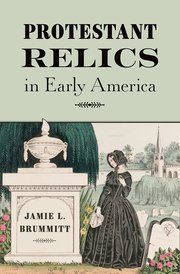
Jamie L Brummitt, Protestant Relics in Early America. 2025
In Protestant Relics in Early America, Jamie L. Brummitt upends long-held assumptions about religion and material culture in the early United States. Brummitt chronicles how American Protestants cultivated a lively relic culture centered around collecting supernatural memory objects associated with dead Christian leaders, family members, and friends. These objects materialized the real physical presences of God, Jesus, the Holy Spirit, and souls of the dead on earth.
As Brummitt demonstrates, people of nearly all Protestant denominations and walks of life--including members of Congress, college presidents, ministers, mothers, free Black activists, schoolchildren, and enslaved people--sought embodied and supernatural sense experiences with relics. They collected relics from deathbeds, stole relics from tombs, made relics in schools, visited relics at pilgrimage sites like George Washington's Mount Vernon, purchased relics in the marketplace, and carried relics into the American Revolution and the Civil War. Locks of hair, blood, bones, portraits, daguerreotypes, post-mortem photographs, memoirs, deathbed letters, Bibles, clothes, embroidered and painted mourning pieces, and a plethora of other objects that had been touched, used, or owned by the dead became Protestant relics. These relic practices were so pervasive that they shaped systems of earthly and heavenly power, from young women's education to national elections to Protestant-Catholic relations to the structure of freedom and families in the afterlife.
In recovering the forgotten history and presence of Protestant relics in early America, Brummitt demonstrates how material practices of religion defined early American politics and how the Enlightenment enhanced rather diminished embodied presence. Moreover, Brummitt reveals how the modern historical method has obscured the supernatural significance of relics for the Protestants who made, collected, exchanged, treasured, and passed them down. This book will be an essential resource for scholars and students of early American history, religion, politics, art, and popular culture.
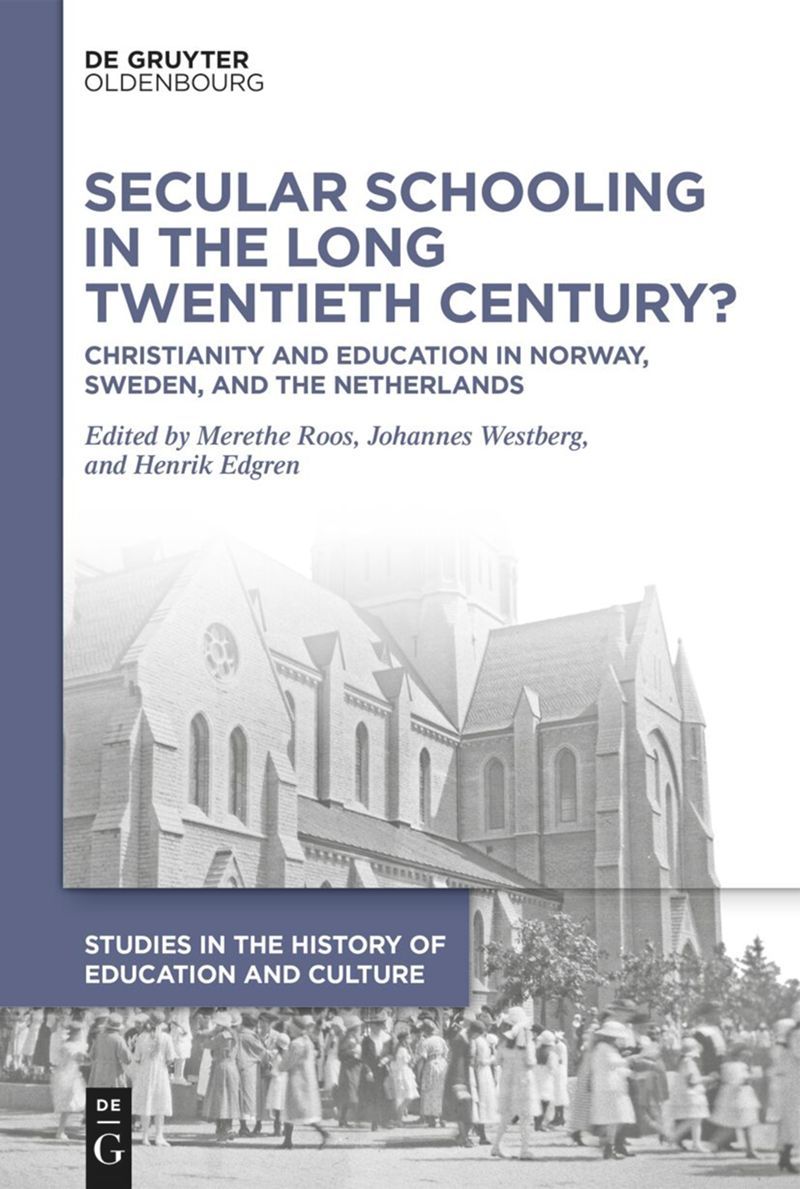
Merethe Roos, Johannes Westberg and Henrik Edgren, eds. Secular Schooling in the Long Twentieth Century? Christianity and Education in Norway, Sweden, and the Netherlands. 2024
The twentieth-century process of secularization does not mean that institutional church and Christian ideas were irrelevant for twentieth-century societal projects – such as the introduction of democracy, the improvement of school and education, the framing of national identities – or in the establishment of welfare-states. On the contrary, this publication is built on the presupposition that secularization runs parallell with the sacralization of the state. It can be argued that Christianity has been decisive for how the modern European society evolved in the twentieth century, e.g. concerning how Christian history and Christian values were a part of the new national and social imaginary where re-enchantment and re-sacralization of the state were central elements.
In this publication, the aim is to highlight the role of Christianity in the twentieth- and twentyfirst-century welfare-state modernization process with the focus on schooling and education. A central perspective is the impact of cultural Protestantism during the twentieth century. The publication is comparative and will investigate education in Norway, Sweden, and the Netherlands via chapters on curriculums, textbooks, politicians, and political debates.
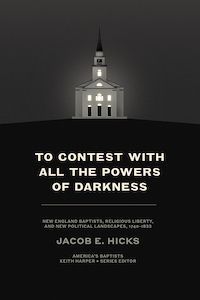
Jacob E. Hicks, To Contest with All the Powers of Darkness: New England Baptists, Religious Liberty, and New Political Landscapes, 1740–1833. 2024
In this new history of the New England Baptists, Jacob E. Hicks teases out the social and political contexts that transformed “rustic” young men like John Leland not only into volunteers for Christ—as wide-roving preachers in the mold of George Whitefield—but also into influential opinion leaders, media entrepreneurs, networkers, and lobbyists in the contentious First Party era of the Early Republic.
Baptist leaders like Isaac Backus, Noah Alden, Samuel Stillman, John Leland, Jonathan Going, and Luther Rice exploited their church-based ministerial training in public speaking, conflict resolution, and intra-denominational networking to become political organizers. With significant gains in the formation of the Warren Association (1767), the Backus-led Grievance Committee (1769), and Leland’s formative experience in the campaign to disestablish Virginia (1780s), the Baptists allied themselves with the rising Democratic-Republican Party, touching off a coalition of anti-Federalist politics and evangelical religion that, while not directly disestablishing Massachusetts, would bear significant fruit in the Religious Freedom Act of 1811.
To Contest with All the Powers of Darkness
brings a unique movement into focus that had at its inception the communal values and ministry preparation practices of a loose network of New England Baptist churches. This movement drove a significant first wedge in the church-state fusion of the Early Republic and, simultaneously, left memorable lessons in successful collective action for a New England Baptist community on the verge of an institutional explosion on the western frontier.
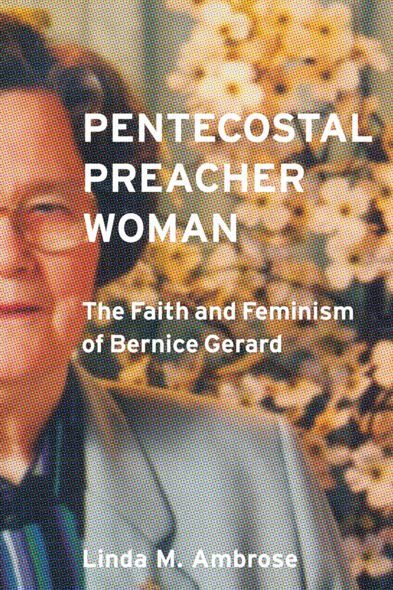
Linda Ambrose, Pentecostal Preacher Woman: The Faith and Feminism of Bernice Gerard. 2025
Evangelical pastor, talk-show host, university chaplain, municipal politician, musician. Pentecostal Preacher Woman explores the multifaceted life of the Reverend Bernice Gerard (1923–2008), one of the most influential spiritual figures of twentieth-century British Columbia, whose complicated blend of social conservatism and social compassion has lessons for our polarized times.
Gerard grew up in the provincial child welfare system and was briefly a teacher before entering the Christian ministry. Attracted to Pentecostalism’s emphasis on direct personal experience of God and the use of spiritual gifts, she became an evangelist and preached around the world. As a pastor, radio personality, and alderman, she was a compelling communicator for the Christian right and an ardent critic of liberal social mores. She was also a contradictory figure. Gerard aligned herself with individuals in the Social Credit party while supporting social justice causes that included the plight of refugees, Indigenous people, and Vancouver’s homeless population. She remained firmly rooted in patriarchal religious institutions but practised a kind of feminism and shared her life with a female partner.
Based on Reverend Gerard’s personal archives and life writing, Pentecostal Preacher Woman foregrounds her own voice to trace the complex evolution of a conservative woman’s ideas about faith and society.
This richly detailed biography illuminates larger themes for scholars and students of gender and women’s history, religious studies, and the history of British Columbia. It will also appeal to readers in Vancouver, across BC, and beyond, and is sure to spark lively discussion among those with knowledge of or curiosity about Pentecostalism.
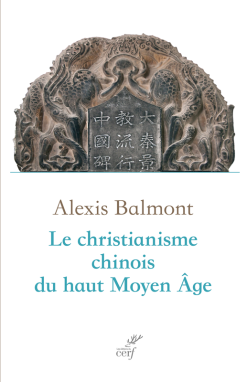
Alexis Balmont, Le christianisme chinois du haut Moyen Âge. 2025
Des missions chrétiennes en Asie, on retient surtout l’évangélisation des jésuites, à partir du xvie siècle. Quelques noms nous reviennent : François-Xavier, Mateo Ricci, Michele Ruggieri... Mais on oublie que les chrétiens d’Orient ont porté l’Évangile en Chine dès le viie siècle et que le christianisme y fut autorisé par l’empereur pendant plusieurs centaines d’années.
C’est cette aventure missionnaire que retrace Alexis Balmont. Il nous livre ici l’histoire des chrétiens syriaques de Perse, de Chine et d’Asie centrale. Il déchiffre aussi leur théologie, fruit d’un dialogue inédit entre la tradition chrétienne et les traditions religieuses de l’Asie, en particulier le bouddhisme, le taoïsme et le confucianisme.
Cet ouvrage contient notamment la première édition critique des sept textes chrétiens chinois du haut Moyen Âge ainsi que la première traduction française jamais réalisée de l’ensemble de ce corpus. L’auteur rassemble ici ce qui est aujourd’hui connu sur ces textes fascinants et inspirants, pour lesquels un nouveau cadre d’interprétation est proposé.
Une contribution novatrice, érudite et extrêmement bien documentée.
Un texte de référence qui renouvelle notre compréhension du fait chrétien en Chine.
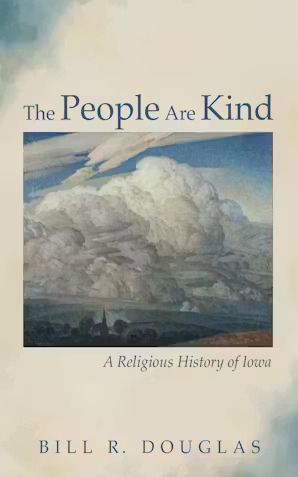
Jill R. Douglas, The People Are Kind: A Religious History of Iowa. 2024
What religion the newly opened, recently indigenous territory of Iowa would become was a matter of concern to German Lutherans, Austrian and French Catholics, and New England Congregationalists. But their funding proved no match for the myriad of choices Iowans had. Methodists were everywhere, and Inspirationists, Freethinkers, and Meskwakis all added to the chorus suggesting that hegemony was not a possibility and cooperation a better strategy. Religious Iowans Black Hawk, Amelia Bloomer, Annie Wittenmeyer, James B. Weaver, Billy Sunday, John R. Mott, Luigi Ligutti, Henry A. Wallace, Ann Landers, Harold Hughes, and Robert Ray all make appearances. How did Sioux City pastor George Haddock get his name on streets in California? How did Rev. George Slater contribute to civil rights? Which state was the go-to for journalists looking for an American religious consensus? How did Dubuque seminary professors feel about nuclear weapons? How did Sr. Pat Farrell parry Vatican accusations of heresy? The answers to those and many other questions the reader never thought to ask lie within. With humor, incisive analysis, and sympathy, Douglas paints a tapestry that contributes not just to religious history but argues for its importance to the history of Iowa.
Finally, for staying up-to-date on the latest titles in all fields, we recommend regularly perusing New Books Network and its "New Books in Christian Studies” page. These pages are updated regularly.